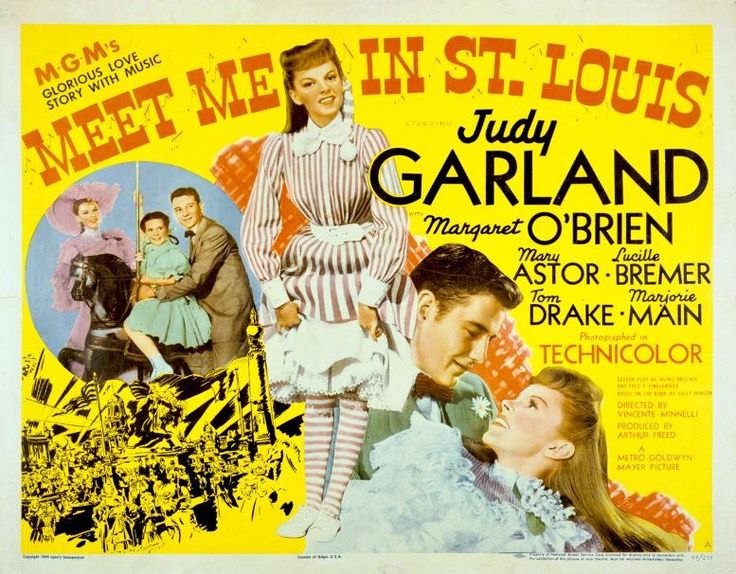
To listen to this reflection as a podcast, click here.
Throughout the season of Advent – which this year encompasses the four weeks leading up to December 25 – we’re looking at classic Christmas movies and how they might connect us to the miracle of God choosing to become a human being.
Judy Garland, at age 22, had no interest in playing another teenager on the silver screen.
She had already been Dorothy in The Wizard of Oz and Betsy Booth in the frantic Andy Hardy movies with Mickey Rooney. In 1944, eager to present herself as an adult, she balked at the invitation to play 17-year-old Esther Smith in a new movie called Meet Me in St. Louis.
MGM mogul Louis B. Mayer, however, ultimately convinced her it would turn out to be a positive experience. He was right.
Garland later acknowledged that Esther Smith was her all-time favorite role. She also enjoyed working with director Vincent Minelli. They married the following year. Best of all, at least for fans of Christmas, she was given the chance to introduce a song that has become a holiday classic: “Have Yourself a Merry Little Christmas.”
Despite extraordinary credentials, Meet Me in St. Louis isn’t widely known today. In 2005, Time magazine identified it as one of the 100 greatest films of all time. It’s one of the few movies honored with a 100% “fresh” rating on Rotten Tomatoes. But one is more likely to see silly flicks like Fred Clause and Jingle All the Way in the December movie rotation than this classic that was nominated for four Academy Awards.
Meet Me in St. Louis is all about family – specifically, a certain Smith family living in St. Louis in 1903. The “plot” is a collection of small, real-life moments in the unfolding story of a mother and father, their children, and a grandfather. The crisis point, such as it is, comes when Mr. Smith receives the news that he is being transferred to New York City. The family will need to move there after Christmas.
Everyone is devasted, especially little Tootie, played by seven-year-old Margaret O’Brien. She wonders if Santa will know how to find them in New York.
Big sister Esther, played by Garland, comforts her with a song. Songwriter Hugh Martin, alert to the sadness of the family’s impending move, created a song that was so sad that Garland begged him to change the words. Here’s his original lyric:
Have yourself a merry little Christmas
It may be your last
Next year we may all be living in the past
Have yourself a merry little Christmas
Pop that champagne cork
Next year we may all be living in New York
No good times like the olden days
Happy golden days of yore
Faithful friends who were dear to us
Will be near to us no more
But at least we all will be together
If the Lord allows
From now on we’ll have to muddle through somehow
So have yourself a merry little Christmas now
It’s hard to disagree with Judy Garland, who said, “If I sing that lyric to little Margaret O’Brien, the audience will think I’m a monster.” Have a great Christmas kid, since this may be the last happy one you’ll ever have. Martin, fortunately, finally gave in and brightened the moment. Here are the words Garland actually sings:
Have yourself a merry little Christmas
Let your heart be light
Next year all our troubles will be out of sight
Have yourself a merry little Christmas
Make the yuletide gay
Next year all our troubles will be miles away
Once again as in olden days
Happy golden days of yore
Faithful friends who were dear to us
Will be near to us once more
Someday soon we all will be together
If the fates allow
Until then we’ll have to muddle through somehow
So have yourself a merry little Christmas now
Here’s the scene from the movie: Have Yourself A Merry Little Christmas | Meet Me In St. Louis | Warner Archive – YouTube. The tears in young Margaret O’Brien’s eyes may bring tears to your eyes, too. It’s easy to see why the Academy honored her with a special Juvenile Oscar the following year.
Many of us are tempted to candy-coat the “family experience” at Christmas. But anyone who has ever been part of a real family knows that pain, uncertainty, and disappointment are all part of the package.
That was Jesus’ experience, too. Christmas cards and church plays faithfully depict the opening scenes of his birth as reported in Matthew and Luke. We relive the trip to Bethlehem, the child wrapped in rags and laid in a manger, shepherds, an angel choir, and that extraordinary star.
But the second act is different. It’s both desperate and dangerous. King Herod aims to murder this infant rival to his throne.
Joseph and Mary, warned in a dream, leave everything within a matter of hours – maybe minutes – and flee the country. They head for Egypt, where they will live as exiles for two years. Verses like Hebrews 2:18, which remind us that Jesus entered into every detail of human life, aren’t just throwaway theology.
Jesus knows what it’s like to be in a family on the run. He has been a refugee without a secure home.
He became one of us so he could know us, die for us, and ultimately set us free.
In his song, Hugh Martin suggests that the best we can do is “muddle through somehow” the messes we’ve gotten ourselves into.
Jesus offers something better: Having been through such messes himself, he’ll walk alongside us today.
